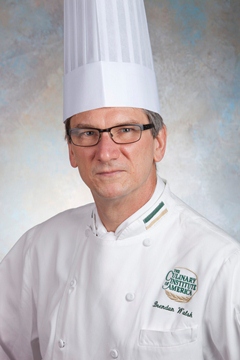 Brendan Walsh, a celebrated chef in New York City and around the country before joining the faculty of The Culinary Institute of America (CIA), has been promoted to serve as the college’s dean of culinary arts. In his new position, he oversees curriculum development and management of the CIA’s culinary-arts education and is responsible for the quality of academic programming, services and staffing of culinary-arts courses.
Brendan Walsh, a celebrated chef in New York City and around the country before joining the faculty of The Culinary Institute of America (CIA), has been promoted to serve as the college’s dean of culinary arts. In his new position, he oversees curriculum development and management of the CIA’s culinary-arts education and is responsible for the quality of academic programming, services and staffing of culinary-arts courses.
“Chef Walsh has demonstrated himself to be a consummate professional with a strong commitment to the college,” said CIA Provost Mark Erickson, CMC. “He is the perfect person to fill this important role at the college—one that is responsible for keeping the CIA’s culinary education unparalleled and will ensure the continued high value of a CIA degree.”
A 1980 CIA graduate, Walsh returned to his alma mater in 2008 as a faculty member and, later, associate dean. Before that, he was the owner and executive chef of Elms Restaurant & Tavern in Ridgefield, Conn., North Street Grill in Great Neck, N.Y., and Coyote Grill in Island Park, N.Y., as well as the founder and president of Chef Brendan Walsh Services/FWF Consulting. Earlier in his career, Walsh held top positions at highly regarded restaurants throughout the United States, including executive chef of Arizona 206 in New York City, Water’s Edge in Long Island City, N.Y., and Ancient Mariner in Florida, Connecticut and New York. He was also chef of Gotham Bar & Grill in New York City and sous chef at Stars in San Francisco.
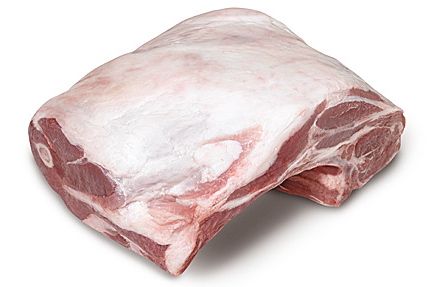 Recognized for its elegance and flavor, lamb is a favorite protein of chefs across the globe. While most chefs think of rack of lamb, today’s economy as well as a desire to utilize the whole carcass challenges chefs to look at some of the lesser-known and economical cuts.
Recognized for its elegance and flavor, lamb is a favorite protein of chefs across the globe. While most chefs think of rack of lamb, today’s economy as well as a desire to utilize the whole carcass challenges chefs to look at some of the lesser-known and economical cuts.
 Brendan Walsh, a celebrated chef in New York City and around the country before joining the faculty of The Culinary Institute of America (CIA), has been promoted to serve as the college’s dean of culinary arts. In his new position, he oversees curriculum development and management of the CIA’s culinary-arts education and is responsible for the quality of academic programming, services and staffing of culinary-arts courses.
Brendan Walsh, a celebrated chef in New York City and around the country before joining the faculty of The Culinary Institute of America (CIA), has been promoted to serve as the college’s dean of culinary arts. In his new position, he oversees curriculum development and management of the CIA’s culinary-arts education and is responsible for the quality of academic programming, services and staffing of culinary-arts courses.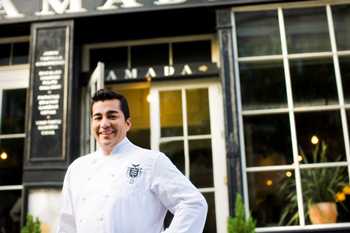 Kendall College announces that Chef Jose Garces, a 1996 graduate of the Kendall College School of Culinary Arts, Food Network Iron Chef and James Beard Award winner, will deliver the commencement address at its 2012 graduation ceremony, to be held on June 24 at Chicago Symphony Center Orchestra Hall. The college will award degrees to more than 400 students in the Schools of Business, Culinary Arts, Education and Hospitality Management.
Kendall College announces that Chef Jose Garces, a 1996 graduate of the Kendall College School of Culinary Arts, Food Network Iron Chef and James Beard Award winner, will deliver the commencement address at its 2012 graduation ceremony, to be held on June 24 at Chicago Symphony Center Orchestra Hall. The college will award degrees to more than 400 students in the Schools of Business, Culinary Arts, Education and Hospitality Management. Emmi Roth USA, the U.S. division of the premium Swiss dairy company, announces the winner of its recipe contest that challenged postsecondary culinary-arts students to create a dish with Emmi Kaltbach Cave-aged Le Gruyère Switzerland AOC. The winning dish, a gluten-free, cayenne-spiced Le Gruyère waffle with quince syrup, was created by Titus Edwards, 21, a student at Central Carolina Community College in Carrboro, N.C. The recipe, which perfectly blends the earthiness of Le Gruyère with the heat of cayenne and sweetness of quince, is on-trend in the culinary world through its address of the increasing sensitivity to gluten among consumers, as well its versatility—pairing well with fried chicken as breakfast-for-dinner, or with eggs and sausage for a sophisticated brunch meal.
Emmi Roth USA, the U.S. division of the premium Swiss dairy company, announces the winner of its recipe contest that challenged postsecondary culinary-arts students to create a dish with Emmi Kaltbach Cave-aged Le Gruyère Switzerland AOC. The winning dish, a gluten-free, cayenne-spiced Le Gruyère waffle with quince syrup, was created by Titus Edwards, 21, a student at Central Carolina Community College in Carrboro, N.C. The recipe, which perfectly blends the earthiness of Le Gruyère with the heat of cayenne and sweetness of quince, is on-trend in the culinary world through its address of the increasing sensitivity to gluten among consumers, as well its versatility—pairing well with fried chicken as breakfast-for-dinner, or with eggs and sausage for a sophisticated brunch meal.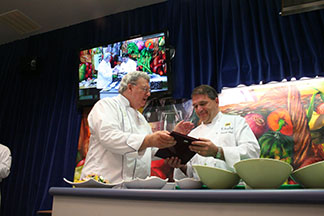 Sullivan University’s National Center for Hospitality Studies (NCHS) in Louisville, Ky., honored Ghyslain Maurais of Union City, Ind.-based Ghyslain Chocolatier with the prestigious Distinguished Visiting Chef award on May 17. As recipient of the award, Maurais presented on-campus cooking demonstrations in addition to a question-and-answer session held exclusively for Sullivan University students.
Sullivan University’s National Center for Hospitality Studies (NCHS) in Louisville, Ky., honored Ghyslain Maurais of Union City, Ind.-based Ghyslain Chocolatier with the prestigious Distinguished Visiting Chef award on May 17. As recipient of the award, Maurais presented on-campus cooking demonstrations in addition to a question-and-answer session held exclusively for Sullivan University students.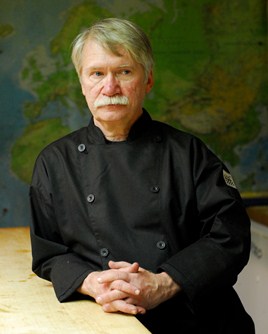 A career educator with 42 years in the food business divulges “musts” to achieve the critical successful relationship between culinary graduate and employer.
A career educator with 42 years in the food business divulges “musts” to achieve the critical successful relationship between culinary graduate and employer.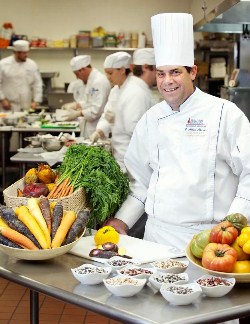 When is a food “heirloom,” and when is it “heritage”? And is buying “local” more or less beneficial to the planet than buying “organic”? Here’s a briefing on teaching the meaning of popular food buzzwords to students.
When is a food “heirloom,” and when is it “heritage”? And is buying “local” more or less beneficial to the planet than buying “organic”? Here’s a briefing on teaching the meaning of popular food buzzwords to students. New confections and snacks offer a reliable barometer of consumers’ evolving flavor demands and food choices, as revealed at the 2012 Sweets & Snacks Expo.
New confections and snacks offer a reliable barometer of consumers’ evolving flavor demands and food choices, as revealed at the 2012 Sweets & Snacks Expo.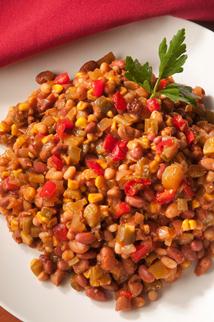 It’s barbecue season, after all. Here are 10 tips from an educator and registered dietitian to make dishes served at the time-honored American backyard celebration both delicious and more healthful.
It’s barbecue season, after all. Here are 10 tips from an educator and registered dietitian to make dishes served at the time-honored American backyard celebration both delicious and more healthful.